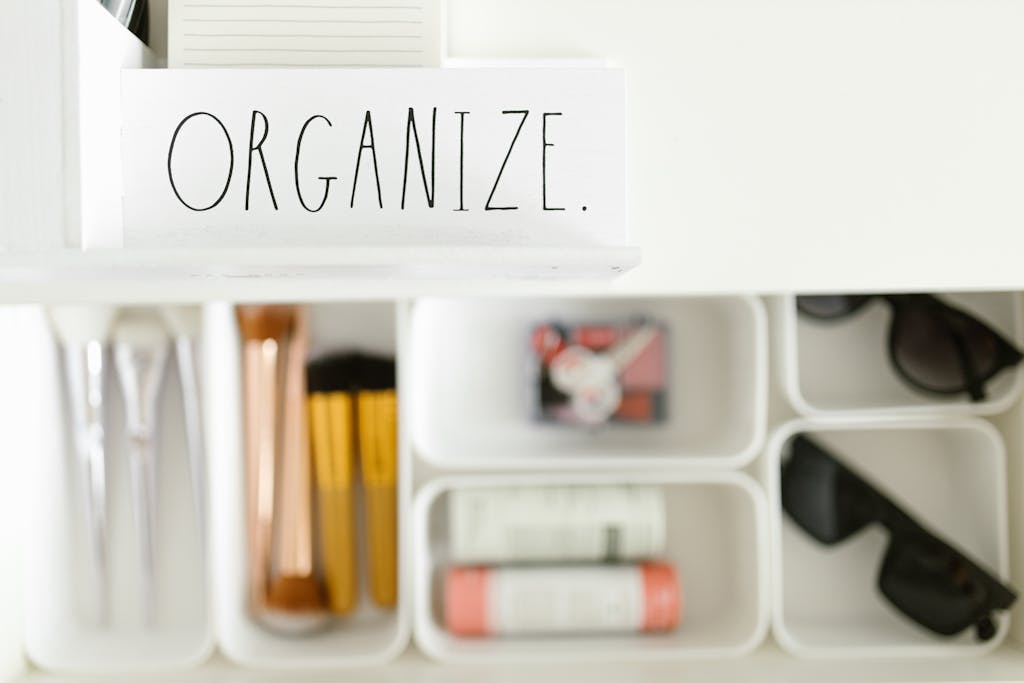
You know that foggy-brain feeling when you’re staring at your computer screen, but nothing’s actually getting processed upstairs? I’ve been there more times than I’d like to admit, especially during those afternoon slumps when my brain feels like it’s running on dial-up internet. The good news is that mental clarity isn’t some mysterious gift you’re born with – it’s actually built through simple daily habits that anyone can master.
Key Takeaways
- Maintain consistent sleep and wake times to train your circadian rhythm and support the brain’s nightly toxin-clearing process.
- Practice morning mindfulness and breathing techniques like 5-5-5 breathing to set your mental tone for the day.
- Limit recreational screen time to 2 hours daily and avoid screens one hour before bedtime for better focus.
- Eat protein-rich meals every 3-4 hours and stay hydrated to maintain steady blood sugar and optimal brain function.
- Clear physical and digital spaces weekly while using time-blocking techniques to reduce distractions and improve concentration.
Maintain a Consistent Sleep Schedule
Although I used to think sleep schedules were just another adulting myth, I’ve learned they’re actually the foundation of mental clarity. When you stick to the same bedtime and wake-up time, you’re essentially training your circadian rhythm like a personal assistant who knows exactly when you need to be sharp.
I discovered this after months of chaotic sleep patterns left me feeling like my brain was running on dial-up internet. Now I maintain a consistent sleep schedule, going to bed at 10:30 PM and waking at 6:00 AM daily. This routine has dramatically improved my sleep quality and mental focus.
Your body craves predictability, and when you give it that gift, you’ll unleash better cognitive function and emotional stability that’ll make you unstoppable. Sleep specialists recommend maintaining this consistency because it decreases the likelihood of insomnia and helps your body maintain its natural sleep-wake cycle.
Prioritize Quality Sleep as Brain Maintenance
While maintaining a consistent schedule sets the stage, the actual quality of your sleep is where the real magic happens for your brain. Think of quality sleep as your brain’s nightly maintenance crew—they’re literally flushing out cognitive junk while you’re unconscious.
Your brain’s glymphatic system acts like a power washer, clearing toxins that build up during your waking hours. Without proper brain health maintenance, you’re fundamentally running on yesterday’s mental sludge. Chronic sleep deprivation creates cognitive issues similar to traumatic brain injuries—not exactly the sharp, commanding presence you’re after.
When you prioritize quality sleep, you’re investing in tomorrow’s mental clarity and cognitive function. Your sleep schedule becomes your secret weapon for peak performance, mood regulation, and laser-sharp focus that others will envy. For those with ADHD, quality sleep becomes even more critical since flexible systems that support your natural energy rhythms can make the difference between high-functioning days and overwhelming mental fog.
Manage Daily Stress Proactively
Getting your sleep dialed in is only half the battle—stress has a sneaky way of turning your brain into scrambled eggs even when you’re well-rested. Your mental health depends on building bulletproof systems that crush stress before it crushes you.
I’ve learned that waiting until you’re overwhelmed is like trying to fix a leaky roof during a hurricane. Your daily routine needs stress-busting built right in, not tacked on as an afterthought.
Here’s what actually moves the needle:
- Morning mindfulness practice – Even 5 minutes of deep breathing sets your mental tone
- Scheduled worry time – Contain anxiety to 15-minute blocks instead of all-day spirals
- Movement breaks – Short walks reset your brain’s stress circuits
- Journaling – Dump mental clutter onto paper
- Self-care boundaries – Protect your energy like the precious resource it is
Taking a break from screens during a digital detox day can be refreshing and help you reconnect with yourself while reducing the constant mental stimulation that feeds stress.
Limit Screen Time and Digital Overload

Your phone’s probably buzzing right now, isn’t it? I used to check my devices roughly 150 times a day until I realized my brain felt like scrambled eggs by evening, so I started setting specific screen limits and creating sacred tech-free spaces in my home.
Trust me, when you’re scrolling through social media at 11 PM wondering why you can’t think straight, it’s time to draw some digital boundaries that actually stick. One powerful way to reclaim your focus is using blue light strategically during work hours to keep your brain alert, then switching to warmer lighting in the evening to help your mind naturally wind down.
Set Daily Screen Limits
Since I started tracking my phone usage three months ago, I’ve been horrified to discover I was spending nearly six hours a day mindlessly scrolling through apps – that’s basically a part-time job’s worth of screen time! Setting daily limits became my secret weapon for taking back control and actually having time for activities you enjoy.
Here’s how to create boundaries that stick:
- Set a firm 2-hour daily limit for recreational screen time
- Use built-in screen time controls or apps like Freedom to enforce limits
- Replace scrolling with healthy coping skills like journaling or walking
- Prioritize sleep by avoiding screens one hour before bedtime
- Track your usage weekly to stay accountable
You’ll be amazed how much mental space opens up when you decrease stress from constant digital stimulation.
Create Tech-Free Zones
Beyond setting daily limits, I learned that certain spaces in my home had become battlegrounds between me and my devices – and honestly, my phone was winning most of the fights. Creating tech-free zones became my secret weapon for reclaiming control.
I started with my bedroom, banishing all screens after 9 PM. This daily habit transformed my sleep quality within two weeks. Next, I claimed the dining table, establishing a routine where meals meant conversation, not scrolling. Setting boundaries like this felt awkward initially, but these tech-free zones became my mental sanctuaries.
When you unplug from specific spaces, your brain learns to associate those areas with calm and focus instead of digital chaos.
Incorporate Regular Physical Exercise
When I first heard that exercise could make me smarter, I’ll admit I was skeptical – after all, I’d spent years perfecting my couch-sitting technique. But here’s what changed my mind: just 30 minutes of physical activity literally sends more oxygen to your brain, sharpening your focus instantly.
Your mental clarity arsenal should include:
- Aerobic activities like brisk walking or cycling to grow new brain cells
- Strength training twice weekly to boost nutrient delivery to your brain
-
- Yoga sessions for stress reduction and mental balance
- Swimming for full-body cognitive enhancement
- Dance or sports for variety and sustained motivation
- Yoga sessions for stress reduction and mental balance
I started with 20-minute morning walks, and within two weeks, my afternoon brain fog disappeared. Exercise isn’t just about muscles – it’s about commanding peak mental performance when you need it most. For maximum cognitive benefits, consider incorporating exercise into your 5 AM morning routine when your mind is naturally primed for focus and the quiet environment supports both physical activity and mental clarity.
Fuel Your Brain With Proper Nutrition
You know how your smartphone dies when the battery runs low? Your brain works the same way, and trust me, I’ve learned this the hard way after countless foggy afternoons.
A balanced diet isn’t just trendy advice—it’s your secret weapon for mental dominance. I swapped my usual processed snacks for omega-3 rich salmon, nuts, and leafy greens about six months ago. The difference? Night and day.
Your brain craves premium fuel, not processed junk—make the swap and watch your mental clarity skyrocket overnight.
Whole grains and lean proteins keep your energy steady, preventing those 3 PM crashes that used to derail my productivity.
Eat every 3-4 hours, drink water like it’s your job, and reduce stress by avoiding sugar rollercoasters. Start your day with protein-rich breakfasts like Greek yogurt parfaits or quinoa bowls to maintain steady blood sugar and enhance cognitive function throughout the morning. These daily habits transformed my mental clarity from mediocre to razor-sharp. Your brain deserves premium fuel, not junk.
Practice Mindfulness Throughout the Day

You may have noticed that your mind races like a hamster on a wheel most days, jumping from your morning coffee worries to tonight’s dinner plans in about three seconds flat.
The good news is that mindfulness doesn’t require you to sit cross-legged for an hour chanting “om” – you can actually practice it while brushing your teeth, waiting in line, or even during those awkward elevator rides. Try the 5-5-5 breathing technique while walking – breathe in for 5 steps, hold for 5 steps, and release for 5 steps, making it easier to follow than sitting still and perfect for busy schedules.
Mindful Breathing Techniques
Breathing might seem like the most basic thing we do, but I’ve discovered that most of us are actually terrible at it. You’re probably doing those shallow chest breaths right now, which keeps your mind scattered and stressed. Deep breathing actually becomes your secret weapon for mental clarity when you make it a daily habit.
I started doing box breathing for just three minutes before important meetings, and it’s honestly changed everything. Mindfulness can help you stay anchored in the present moment instead of spiraling into mental chaos. When you regulate your mood through intentional breathing, you’re literally rewiring your brain for better decision-making.
-
-
- Box breathing: Inhale 4 counts, hold 4, exhale 4, hold 4
- Before meals: Take five deep breaths to center yourself
- Work breaks: Use alternate nostril breathing for instant reset
- Morning routine: Start with 2-3 minutes of mindful breathing
- Stressful moments: Pause and do slow, deliberate exhales
-
Present Moment Awareness
While breathing techniques get your mind centered, staying present throughout your entire day is where the real magic happens for mental clarity. You don’t need to become a meditation guru, just catch yourself when your brain starts spiraling about tomorrow’s deadline or last week’s awkward conversation.
Try this: set three random phone alarms throughout your day. When they buzz, pause for 30 seconds and notice what’s actually happening right now. What do you smell? How does your chair feel? This simple mindfulness practice interrupts rumination and resets your cognitive function instantly.
I started doing this during my morning coffee routine, actually tasting each sip instead of mindlessly scrolling. That present moment awareness transformed my entire morning, and the self-reflection helped me make sharper decisions all day.
Declutter Your Physical Environment

Since your physical space directly mirrors your mental state, tackling that pile of papers on your desk isn’t just about looking organized—it’s about clearing your mind. When you declutter your physical environment, you’re literally creating more mental space for what matters.
That messy bedroom corner you’ve been avoiding? It’s probably stealing focus you didn’t even know you had.
Start small and watch your mental clarity improve dramatically:
-
-
- Sort papers weekly – File, toss, or act on every document
- Clear surfaces daily – Keep desks and counters item-free
- Donate unused items monthly – If you haven’t touched it in six months, goodbye
- Organize digital files quarterly – Your computer desktop counts too
- Maintain one designated workspace – Reduce distractions by having everything in its place
-
Your environment shapes your thoughts more than you realize.
Consider using a comprehensive decluttering planner to systematically tackle each area of your home and maintain your newly organized space.
Take Regular Breaks to Recharge
You can’t pour from an empty cup, and your brain works the same way—it needs regular pit stops to keep running smoothly. I learned this the hard way after spending 6 hours straight coding and realizing I’d been staring at the same bug for 45 minutes without making any progress.
The secret isn’t just taking any break, but timing them strategically during work and giving yourself real recovery time when you’re completely off the clock. Just like your circadian rhythm thrives on consistent patterns, your mind performs better when you establish regular break intervals that signal when to focus intensely and when to truly rest.
Schedule Strategic Work Breaks
Despite what your go-getter mentality might tell you, your brain isn’t a machine that can run at full throttle for eight hours straight without consequences. You’ll actually gain more power by scheduling strategic work breaks into your daily routine. Make time for these small mental resets, and you’ll take your productivity to the next level.
Set a timer for every 90 minutes – your brain naturally cycles through focus periods. Take 5-minute micro-breaks between tasks to prevent mental pile-up. Schedule a proper 15-minute break every two hours for deeper recharge. Block out 30 minutes at lunch to completely disconnect from work mode. Plan weekend downtime without any work-related activities.
Strategic breaks aren’t laziness – they’re brain fuel.
Embrace Full Recovery Time
While those strategic work breaks we just covered will keep your mental engine humming throughout the day, there’s another level of recovery that’s absolutely essential for long-term mental clarity.
You need to embrace full recovery time – those longer stretches where you completely disconnect from work. I’m talking about your weekends, vacations, and even those sacred Sunday afternoons when you refuse to check emails. This isn’t laziness; it’s mental maintenance.
New research confirms what you probably already suspect: your brain needs time to fully recharge, not just pause. Those two-week vacations aren’t luxuries – they help prevent the kind of burnout that’ll make you stare blankly at your computer screen for hours. Schedule genuine downtime, and watch your mental sharpness return with a vengeance.
Set Clear Personal and Professional Boundaries
When I finally learned to say “no” without feeling guilty, my stress levels dropped by what felt like 50% overnight. You’ve got to communicate your limits clearly, or people will keep pushing. I used to answer emails at 11 PM like some kind of workaholic superhero. Spoiler alert: I wasn’t saving anyone, just burning myself out.
Setting boundaries gives you enough time for what actually matters. Self-reflection can help you identify where you’re overcommitting. Your emotional well-being depends on protecting your energy like it’s your bank account. Use the Eisenhower Matrix to distinguish between urgent requests and truly important priorities when deciding where to draw the line.
Here’s what works for establishing a routine:
-
-
- Block specific hours for deep work without interruptions
- Set “office hours” when colleagues can reach you
- Create separate spaces for work and personal time
- Practice saying no to non-essential requests
- Schedule regular check-ins with yourself
-
Prioritize Your Most Important Tasks First
You know how you’ll spend twenty minutes organizing your desk drawer while that big project deadline looms over your head like a storm cloud? That’s your brain trying to trick you into feeling productive by tackling the easy stuff first, but it’s actually sabotaging your mental clarity and leaving you stressed about the important work.
The secret is flipping this habit upside down—identify your two or three high-impact activities each morning, then tackle those heavy hitters before you even think about checking email or reorganizing your workspace.
Identify High-Impact Activities
The secret to mental clarity isn’t cramming more tasks into your day—it’s identifying the handful of activities that actually move the needle forward. You need to separate the wheat from the chaff, focusing on things that create positive momentum rather than just keeping you busy.
Here’s how to spot your high-impact activities:
-
-
- Revenue generators – Tasks that directly increase income or advance career goals
- Relationship builders – Activities that strengthen key personal and professional connections
- Health investments – Exercise, meal prep, and other habits that improve your mental well-being
- Skill developers – Learning opportunities that compound over time
- Problem solvers – Issues that, once resolved, eliminate recurring headaches
-
These activities might feel harder initially, but they’re what separate successful people from perpetually busy ones.
Avoid Low-Value Distractions
How often do you find yourself answering emails at 9 AM instead of tackling that important project you’ve been putting off for weeks? You’re not alone in this productivity trap. Low-value distractions steal your mental energy and sabotage your power to achieve something meaningful.
| Low-Value Activity | Time Wasted Daily | Better Alternative |
|---|---|---|
| Social media scrolling | 2-3 hours | Deep work sessions |
| Unnecessary meetings | 1-2 hours | Focused project time |
| Email checking | 45 minutes | Batch processing |
To improve your focus, add one healthy habit: designate your first two hours for high-impact work only. Support this by turning off notifications and getting quality sleep. Your future self will thank you for protecting those precious morning hours when your brain’s firing on all cylinders.
Cultivate Meaningful Social Connections
While scrolling through social media might feel like connection, it’s actually leaving you more isolated than that awkward small talk at the grocery store checkout. Social interactions provide emotional support that your brain craves, but you’ve got to be strategic about it. Instead of doom-scrolling for two hours, invest that time in meaningful relationships that’ll actually power up your mental clarity.
Your brain craves real connection, not the hollow dopamine hit from endless scrolling through strangers’ highlight reels.
Schedule weekly family dinner dates (yes, put it in your calendar like a business meeting)
Text three friends every Tuesday to check in and stay connected
Join one hobby group where you’ll meet like-minded people regularly
Set phone boundaries during quality time with loved ones
Plan monthly coffee dates with colleagues outside the office
These interactions provide emotional fuel that helps you make positive changes and think clearer.
Practice Daily Gratitude
Unless you’re naturally wired to see rainbows and sunshine everywhere (lucky you), your brain’s probably stuck in complaint mode most of the time. Here’s where a daily gratitude practice becomes your secret weapon for mental clarity. Start a gratitude journal – just three things you’re thankful for each morning takes two minutes max. I write mine while my coffee brews, listing everything from “my dog didn’t destroy my shoes” to bigger wins.
Those feelings of gratitude literally rewire your brain to notice good stuff instead of dwelling on what’s wrong. Expressing gratitude through quick thank-you texts strengthens your network too. This simple habit shifts your mental focus from problems to possibilities, helping you think clearer and make better decisions. It’s like giving your brain premium fuel instead of junk.
Engage in Regular Self-Reflection
Building that gratitude muscle is just the beginning – now you need to actually check in with yourself regularly to see how you’re really doing. Think of it as a regular date night with yourself, except you’re diving deep into your mental state instead of arguing over restaurant choices.
Self-reflection helps you catch stress before it steamrolls your peace of mind. When you can’t fall asleep at night because your brain won’t shut up, that’s your cue to dig deeper.
- Journal for 10 minutes each morning to dump your thoughts
- Ask yourself three questions: What’s working? What isn’t? What needs to change?
- Schedule weekly mental health check-ins like doctor appointments
- Practice self-compassion when you mess up your routine
- Seek professional emotional support and promote your well-being when needed
Adequate sleep can help you make proactive changes effectively.
Include Simple Pleasures in Your Routine
Sometimes the best mental health advice sounds suspiciously like what your grandma would tell you – take time to smell the roses, dear. She wasn’t wrong. When you make a daily habit of simple pleasures, you’re actually rewiring your brain for success.
I started lighting a $3 vanilla candle every morning while drinking coffee, and it became my power-up ritual. Create a routine around these micro-moments – they’re small and make proactive changes that compound over time. Your brain craves these predictable comfort anchors, giving you a sense of belonging in your own life.
Whether it’s five minutes of jazz music or herbal tea at 3 PM, these rituals enhance your mental clarity by reducing stress hormones and boosting feel-good chemicals.
Challenge Your Brain With New Activities

While those comfort rituals keep your mind grounded, your brain also needs the opposite – a good challenge that makes it sweat a little. When you tackle new things regularly, you’re literally rewiring your neural pathways and cranking up BDNF production, which keeps your neurons happy and thriving.
Your brain craves the mental equivalent of a workout – fresh challenges that force those neural pathways to stretch and grow.
Think of challenging activities as your brain’s personal trainer. Here’s what’ll boost mental performance:
- Take that dance class you’ve been eyeing for months
- Learn coding basics with free online tutorials
- Pick up a musical instrument (even a $30 ukulele works)
- Study a new language for 15 minutes daily
- Solve puzzles or brain teasers during coffee breaks
Every challenging activity is a work in progress, and that’s the point. You don’t need perfection – you need the mental stretch. These challenges improve mental clarity by forcing your brain to create fresh connections.
Stay Hydrated Throughout the Day
You know that feeling when your brain feels like it’s wrapped in cotton and simple decisions seem impossible? That fuzzy, unfocused state often comes from something surprisingly basic – not drinking enough water throughout the day.
Your brain actually needs consistent hydration to fire on all cylinders, and I’ve learned the hard way that even mild dehydration can turn me into a scattered, unfocused individual who can’t recall where I put my keys five minutes ago.
Water and Brain Function
Since your brain is basically a wrinkled water balloon that’s 73% H2O, keeping it properly hydrated isn’t exactly optional if you want it to work well. When dehydration hits, your cognitive performance takes a nosedive faster than your motivation on Monday morning.
Even losing just 1-2% of your body weight in fluids can mess with your reaction time and short-term memory. That’s like forgetting where you put your keys, then forgetting you were looking for them in the first place.
Here’s what proper hydration does for your mental clarity:
-
-
- Sharpens your focus and attention span
- Boosts problem-solving abilities
- Improves mood and reduces brain fog
- Enhances memory formation and recall
- Speeds up mental processing
-
Keep water, herbal tea, or other non-caffeinated drinks nearby throughout your day.
Daily Hydration Goals
The magic number everyone throws around is 64 ounces of water daily, but honestly, that’s just your starting point. Creating a routine that prioritizes hydration will transform your mental game. Take care to spread those 8 glasses throughout your day, not chugging them all at once like some college drinking contest.
| Time | Amount | Mental Benefit |
|---|---|---|
| Morning | 16 oz | Kickstarts brain function |
| Midday | 24 oz | Prevents afternoon fog |
| Evening | 24 oz | Maintains focus for tasks |
Taking medications? You’ll need even more water. Your routine should include carrying a reusable bottle and setting phone reminders every hour. Watch your urine color – pale yellow means you’re winning, darker yellow means you’re losing the hydration battle. Maintaining a healthy water intake isn’t negotiable for peak performance.
Hydration Tracking Methods
Tracking your water intake sounds about as exciting as watching paint dry, but honestly, it’s the difference between staying sharp and feeling like your brain’s running on fumes. When you’ve got something proactively to manage your hydration, you’ll notice signs of stress decreasing and mental fog lifting.
Use apps like WaterMinder or Hydro Coach to set 64-ounce daily goals. Carry a marked water bottle showing hourly targets throughout the day. Set phone reminders every 90 minutes to prompt regular sips. Add fruit slices or mint to make plain water more appealing. Consider adjusting your routine during workouts or hot weather for increased intake.
Making proactive changes to address dehydration transforms your mental performance completely.
Seek Professional Support When Needed
While we’d all love to figure out our mental fog with just green tea and morning walks, sometimes your brain needs backup from the professionals.
When your cognitive clarity consistently tanks despite your best efforts, it’s time to call in reinforcements.
A healthcare provider can pinpoint underlying issues you’d never consider, like hormone imbalances or sleep disorders. They’ll evaluate whether medications consistently support your mental sharpness or if you need different approaches.
Therapy options like cognitive-behavioral therapy help rewire thought patterns that cloud your thinking. Counseling provides tools to manage stress that’s sabotaging your focus. I’ve seen people transform their mental game in just three months with professional guidance.
Don’t let pride keep you stuck in mental quicksand when experts can pull you out.
Conclusion
You’ve got 18 powerful tools now, and honestly, you don’t need to tackle them all at once. Start with just two or three that feel manageable—maybe fixing your sleep schedule and drinking more water. I’ve learned the hard way that trying everything simultaneously usually leads to doing nothing well. Pick your favorites, stick with them for a few weeks, then gradually add more. Your brain will thank you, trust me.
Comment
Comments are closed.



Pingback: How to Turn Your Setbacks Into Comebacks